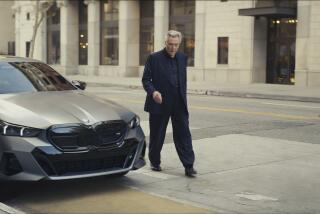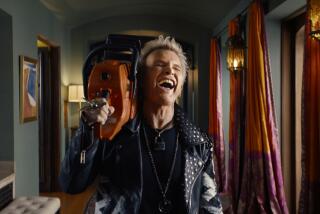Charmin’s bears are just cruel now. How coronavirus has changed TV ads

- Share via
Expedia’s globe-trotting garden gnome is grounded. Geico’s high-fiving office worker has stopped slapping hands with her colleagues. And that elderly gentleman who liked to hand out Hershey chocolate bars and hugs to anyone and everyone? One can only assume he’s sheltering at home, surrounded by unopened cartons of all that sweet goodwill, hoping he won’t be accused of hoarding.
Television ads, like the folks who watch them, have altered their routines in response to COVID-19. It’s been more than a month since advertisers had to abruptly change their messaging or risk damaging their brands with pre-pandemic ads that all of a sudden felt tone-deaf.
Norwegian Cruise Lines felt the burn when its “Feel free to feel more” spots featuring healthy vacation revelers partying on deck ran between newscasts about infected passengers being forced to quarantine on ships as the coronavirus invaded the U.S.
And as more changes by the day, the week and now the month, so does the tone of the ads we’re seeing.
“Now more than ever, play it safe ... with 1-800-SafeAuto.”
“Stay safe ... and stay entertained while staying home with DirecTV.”
“Together, we can do this. Our spirit is what unites us. It is what bonds us and reminds us we are all one. Better days are ahead ... and Chrysler, Dodge, Jeep and Ram will help you drive forward.”
But where are we going, SoCal? Not to the mall, the hair salon or a state park. Never mind. Just shut up and drive.
From Walmart to Google, brands have had to adapt their advertising messages to convey more empathy with consumers during the coronavirus crisis.

No one knows what’s coming next, television advertisers included, but it’s been impressive to watch how fast they pivoted in response to the global crisis, and how they continue to morph. Companies that previously tied their brands to carefree lifestyles, fun in the sun or freedom suddenly began producing commercials that sounded like eerie “Twilight Zone” intros.
“Sometimes life can get a little dark. Let the new Kia Sorento light the way to a better tomorrow.” Perhaps that’s the light at the end of the tunnel President Trump was referring to while disseminating misinformation, politicizing a health epidemic and berating the White House press pool for doing its job.
As The Times’ Meg James reported, a survey by the Assn. of National Advertisers found that 92% of marketers had adjusted their messages since mid-March. Nearly half of respondents said their modifications were “substantial.” The busy soccer mom of pre-virus ads has been swapped out for stay-home parents practicing yoga with ghoulishly compliant children. The go-getter careerist has swapped his crisp dress shirt for a crisp T-shirt for kitchen table Skype calls with his loved ones.
The only folks outside seem to be those pictured in pharmaceutical ads. They’re still celebrating something on dance floors and taking pensive moments in grassy meadows with their moderate to severe plaque psoriasis and overactive bladders.
Corona’s Hard Seltzer ad is void of all humans. It’s just shots of tropical turquoise water, blue skies, empty stretches of pristine beaches. “Find your beach,” it advises. And while you’re at it, try to forget Corona shares its name with the type of virus responsible for the pandemic that’s making life so miserable we have to spike our seltzer to cope.
While viewership is up across platforms — audience numbers have jumped by the millions on cable and network TV, and a record 15.7 million people signed up for Netflix in the first three months of the year — those who’ve been immersed in ad-free streamers are missing out on the changing narratives of sponsored content.
Today’s social distancing orders make the commonplace themes of pre-COVID ads — singles fraternizing in crowded bars, teen potato chip parties, folks all feasting from a communal bucket of fried chicken — look like cautionary tales, the unwitting equivalent of a “This is your brain on drugs” PSA. Flo needs more than just Progressive insurance. She needs a face mask.
The reality of 2020 cabin fever has been harder to capture, but Burger King does a valiant job. Its new ad features an assortment of sofa-bound, pajama-clad individuals staring at their TV screens, waiting out the storm in dishevelment and sloth. “The country needs you to stay on your couch, and Burger King is here to help,” says a narrator, who announces the fast food chain is waiving delivery fees and donating to the American Nurses Foundation. In essence, you’re helping flatten the curve and support essential workers by ordering a Whopper and fries. “Be a true couch Potatriot!”
On the flip side, there’s been a proliferation of commercials for fitness apps like Noom and exercise programs such as Beach Bodies on Demand, because God knows we all need some dietary discipline and cardio at this point. The meditative app Calm was quick to react to the systemic panic. Its “30 seconds of Calm” spots offer reflective, soothing sounds and nature scenes (and sometimes LeBron James). A recent one, however, featured aerial shots of ruins and pyramids, all remnants of a once vibrant, now extinct civilization. Breathe deep, let go ...
At a moment in which viewers are eager for facts about the coronavirus outbreak, nightly news programs and other venerable formats are delivering.

Ads shilling credit programs, or programs to get creditors off your back, also appear more plentiful — which makes sense given the economic fears and realities unleashed by the coronavirus. Domino’s Pizza wants Americans to know it’s hiring in an ad that’s partly designed to look like a video conference meeting.
Most frustrating are commercials for things we can’t find anywhere. Charmin’s cartoon bears’ playful conversations about their beloved rolls are cruel at this point. Cottonelle at least urged consumers to stop hoarding toilet paper, asking them to “share a square” with friends and neighbors in need. Cottonelle donated $1 million and 1 million rolls of toilet paper to the United Way’s COVID-19 Community Response and Recovery Fund, and pledged $1 for every social media post using the hashtag #ShareASquare, up to $100,000, through June.
The ad for Bounty, “The Quicker Picker Upper” — dinner spills; the dog eats the dumpling— isn’t new, and it hasn’t aged well. It clearly takes place in an alternative universe where paper towels are not selling for $35 on Ebay.
To be fair, advertising anything right now is a high-wire act. The safest way into a consumer’s heart, and pocketbook, is reinforcing that he or she is doing the right thing by never leaving the house again (or at least until those orders are lifted). “Stay healthy. Stay safe. Stay home — for each other” is Tylenol’s message. The parent in the ad has comfortably succumbed to being driven mad by the kids. He’s wearing a tutu as he dances with his daughter.
Uber’s ad is even simpler: “Thank you for not riding.”
More to Read
The complete guide to home viewing
Get Screen Gab for everything about the TV shows and streaming movies everyone’s talking about.
You may occasionally receive promotional content from the Los Angeles Times.







